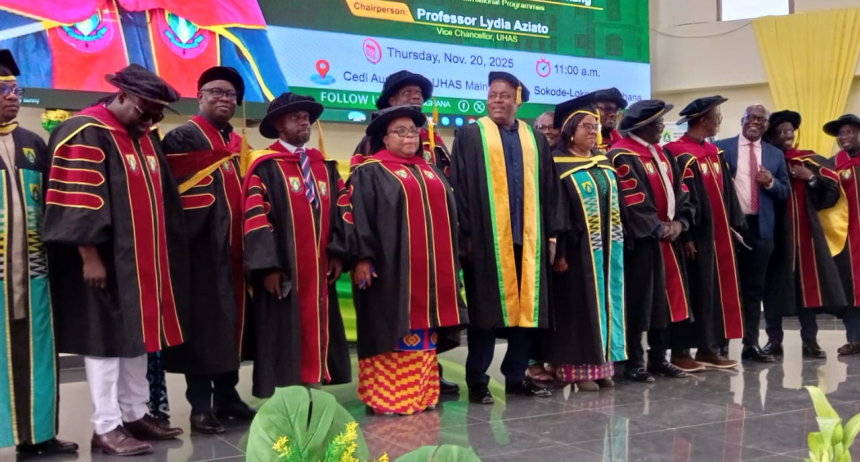The University of Health and Allied Sciences (UHAS) has held its Seventh Inaugural Lecture in honour of Professor Elvis Enowbeyang Tarkang, Dean of International Programmes, to mark his elevation to the rank of a full Professor, the highest point in his academic career.
The lecture, held on Thursday, focused on the theme: “Developing Tailored Interventions Embedded in Best Evidence and Theory to End AIDS by 2030 in Ghana.”
Prof. Tarkang noted that Human Immunodeficiency Virus (HIV) remained a major public health challenge, particularly in sub-Saharan Africa, despite global progress in the HIV response.
He said the UNAIDS global 95-95-95 targets provided a clear roadmap for ending AIDS by 2030, yet Ghana still faced significant gaps.
He cited the 2024 Ghana AIDS Commission report, which indicated that out of 334,721 people living with HIV (PLHIV), only 68 per cent knew their status, while 47 per cent were on antiretroviral therapy (ART), and just 42 per cent had achieved viral suppression.
“These gaps in the treatment cascade threaten the achievement of epidemic control,” he said.
Prof. Tarkang emphasised that achieving the 95-95-95 targets required a deeper understanding of the predictors of HIV testing, ART adherence, viral suppression, and HIV-related stigma and discrimination (SAD).
He argued that interventions grounded in behavioural science theories were more effective than those without a theoretical foundation.
He explained how models such as the Health Belief Model (HBM), Theory of Planned Behaviour (TPB), and Social Cognitive Theory (SCT) could guide effective intervention design.
He referenced several studies conducted across Ghana that applied these theories to improve HIV testing uptake, ART adherence, post-exposure prophylaxis (PEP) practices, and stigma reduction and stressed the need to address stigma at individual, community, and institutional levels.
“Stigma and discrimination undermine treatment adherence and access to testing. To end AIDS by 2030, SAD must be tackled head-on,” he said, referencing the Ubuntu concept as a culturally grounded approach to strengthening compassion, community support, and dignity for PLHIV.
According to him, ending AIDS in Ghana was possible if interventions specifically targeting the behavioural constructs would be proven to influence outcomes.
“Focusing on theoretical constructs that show no significant influence will be counterproductive,” he added.
The Vice-Chancellor of UHAS, Prof. Lydia Aziato, who chaired the event, commended Prof. Tarkang for a lecture that demonstrated depth, relevance, and practical value for public health interventions.
She emphasised the importance of combining qualitative and quantitative research approaches, conducting thorough situation analyses before implementing interventions, and applying multiple behavioural theories to achieve a good fit for public health programming.
Prof. Aziato also reflected on the importance of culturally grounded concepts such as Ubuntu, which encouraged kindness, empathy, and harmonious community living, value she said were essential for healthcare delivery and health promotion.
She urged faculty and researchers to remain accountable, noting that research grants and academic titles come up with responsibilities.
“Prof. Tarkang has shown that it is possible to rise through the ranks with evidence and excellence. His professorship is comparable to any in the world,” she said.
The event featured traditional leaders, family and friends, Deans, faculty members, UHAS Council representatives, students, and other dignitaries who delivered goodwill messages, commendations, and citations in honour of Prof. Tarkang.
The ceremony celebrated not only his academic achievements but also his contribution to HIV research, public health advocacy, and internationalisation efforts within UHAS.






